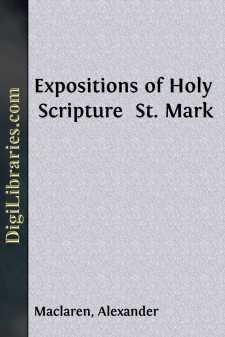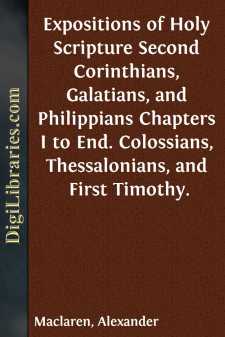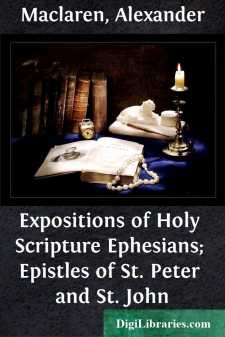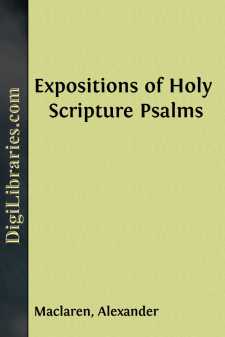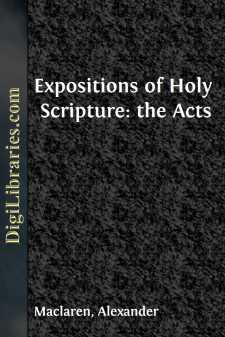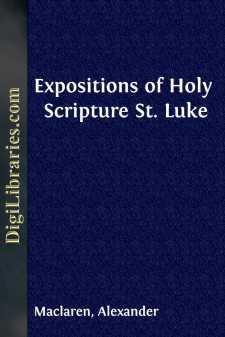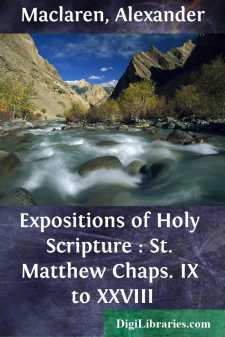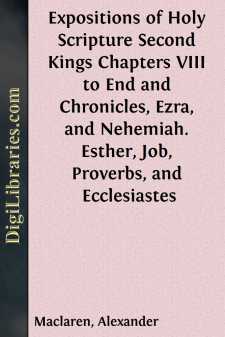Categories
- Antiques & Collectibles 13
- Architecture 36
- Art 48
- Bibles 22
- Biography & Autobiography 813
- Body, Mind & Spirit 142
- Business & Economics 28
- Children's Books 17
- Children's Fiction 14
- Computers 4
- Cooking 94
- Crafts & Hobbies 4
- Drama 346
- Education 46
- Family & Relationships 57
- Fiction 11829
- Games 19
- Gardening 17
- Health & Fitness 34
- History 1377
- House & Home 1
- Humor 147
- Juvenile Fiction 1873
- Juvenile Nonfiction 202
- Language Arts & Disciplines 88
- Law 16
- Literary Collections 686
- Literary Criticism 179
- Mathematics 13
- Medical 41
- Music 40
- Nature 179
- Non-Classifiable 1768
- Performing Arts 7
- Periodicals 1453
- Philosophy 64
- Photography 2
- Poetry 896
- Political Science 203
- Psychology 42
- Reference 154
- Religion 513
- Science 126
- Self-Help 84
- Social Science 81
- Sports & Recreation 34
- Study Aids 3
- Technology & Engineering 59
- Transportation 23
- Travel 463
- True Crime 29
Expositions of Holy Scripture St. Mark
Description:
Excerpt
WHAT 'THE GOSPEL' IS
The beginning of the gospel of Jesus Christ.—Mark i. 1
My purpose now is to point out some of the various connections in which the New Testament uses that familiar phrase, 'the gospel,' and briefly to gather some of the important thoughts which these suggest. Possibly the process may help to restore freshness to a word so well worn that it slips over our tongues almost unnoticed and excites little thought.
The history of the word in the New Testament books is worth notice. It seldom occurs in those lives of our Lord which now are emphatically so called, and where it does occur, it is 'the gospel of the Kingdom' quite as frequently as 'the gospel' of the King. The word is never used in Luke, and only twice in the Acts of the Apostles, both times in quotations. The Apostle John never employs it, either in his 'gospel' or in his epistles, and in the Apocalypse the word is only once found, and then it may be a question whether it refers to the good news of salvation in Jesus Christ. John thought of the word which he had to proclaim as 'the message,' 'the witness,' 'the truth,' rather than as 'the gospel.' We search for the expression in vain in the epistles of James, Jude, and to the Hebrews. Thrice it is used by Peter. The great bulk of the instances of its occurrence are in the writings of Paul, who, if not the first to use it, at any rate is the source from which the familiar meaning of the phrase, as describing the sum total of the revelation in Jesus Christ, has flowed.
The various connections in which the word is employed are remarkable and instructive. We can but touch lightly on the more important lessons which they are fitted to teach.
I. The Gospel is the 'Gospel of Christ.'
On our Lord's own lips and in the records of His life we find, as has already been noticed, the phrase, 'the gospel of the kingdom'—the good news of the establishment on earth of the rule of God in the hearts and lives of men. The person of the King is not yet defined by it. The diffused dawn floods the sky, and upon them that sit in darkness the greatness of its light shines, before the sun is above the horizon. The message of the Forerunner proclaimed, like a herald's clarion, the coming of the Kingdom, before he could say to a more receptive few, 'Behold the Lamb of God.' The order is first the message of the Kingdom, then the discovery of the King. And so that earlier phrase falls out of use, and when once Christ's life had been lived, and His death died, the gospel is no longer the message of an impersonal revolution in the world's attitude to God's will, but the biography of Him who is at once first subject and monarch of the Kingdom of Heaven, and by whom alone we are brought into it. The standing expression comes to be 'the gospel of Christ.'
It is His, not so much because He is the author, as because He is the subject of it. It is the good news about Christ. He is its contents and great theme. And so we are led up at once to the great central peculiarity of Christianity, namely that it is a record of historical fact, and that all the world's life and blessedness lie in the story of a human life and death....


